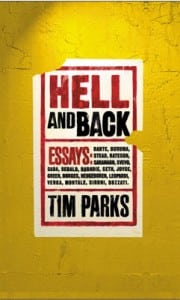 Some twenty years after abandoning my PhD I found myself once again being invited to write a serious literary essay. As so often in my life the Italian connection was crucial. The New York Review of Books decided that I would be the appropriate person to write about Joyce, Svevo and Saba in Trieste. This was followed by an invitation to review a new translation of the poetry of Eugenio Montale. So difficult and exciting and above all dense were these poems, so problematic the idea of translating them, that this essay took me all of a year to put together. It was a year of reading, reading and re-reading the original and the translations and the voluminous notes until at last I felt they made a kind of sense to me, however elusive and arduous to articulate. It was also the year in which I decided that if there were more opportunities to write such essays, I would try to make each of them an engaging work in its own right, a narrative even, rather than the dry and cautious analysis of the academic publication. Montale convinced me, if only because he too was quite convinced, that the relationship between the artist’s work and life is always immensely complicated, each feeding off the other, thwarting or enhancing the other, in all kinds of unexpected ways. My essays would find their energy in these conundrums.
Some twenty years after abandoning my PhD I found myself once again being invited to write a serious literary essay. As so often in my life the Italian connection was crucial. The New York Review of Books decided that I would be the appropriate person to write about Joyce, Svevo and Saba in Trieste. This was followed by an invitation to review a new translation of the poetry of Eugenio Montale. So difficult and exciting and above all dense were these poems, so problematic the idea of translating them, that this essay took me all of a year to put together. It was a year of reading, reading and re-reading the original and the translations and the voluminous notes until at last I felt they made a kind of sense to me, however elusive and arduous to articulate. It was also the year in which I decided that if there were more opportunities to write such essays, I would try to make each of them an engaging work in its own right, a narrative even, rather than the dry and cautious analysis of the academic publication. Montale convinced me, if only because he too was quite convinced, that the relationship between the artist’s work and life is always immensely complicated, each feeding off the other, thwarting or enhancing the other, in all kinds of unexpected ways. My essays would find their energy in these conundrums.
Fortunately, the New York Review didn’t confine me to things Italian. There were invitations to write about Borges and Rushdie, Saramago and Seth. Some people have asked why I didn’t just choose my subjects myself, rather than always accepting commissions. But the excitement of the commission is precisely that of deciding how you think about a writer you may know little of. Sebald’s novels, of which I knew nothing, were a wonderful discovery, Rushdie’s recent work a huge disappointment. To understand as fully as possible why the books provoke such intense and different responses, turning them over and over in the mind, is always a pleasure and a huge challenge.
Not all the essays were written for the NYR. The New Yorker asked me to write about Dante, the London Review about Buruma. Not all the pieces are about literature. The Lancet commissioned me to review two books on the experience of schizophrenics, the NYR again wanted me to look at the paintings of Mario Sironi, the man who did most to create the images by which Italian fascism will always be remembered. Then there was the honour of being invited to write the introduction to a new edition of Henry Green’s masterpiece Party Going, and again to Christina Stead’s extraordinary novel Letty Fox, her Luck.
